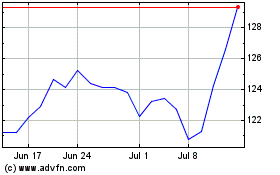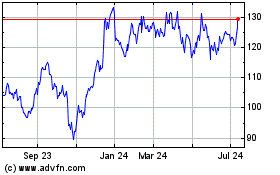SUZHOU--Near a murky river in this eastern Chinese city, a
freshly renovated apartment building touts dozens of furnished
rooms in move-in condition.
Nine months ago it was an abandoned hotel, littered with dirty
clothes and empty food containers. Its former owner had disappeared
several years earlier, leaving behind unpaid bank loans, according
to documents reviewed by the Journal.
In 2017 a fund managed by Bain Capital Credit stepped in. It
bought the defaulted debt, navigated China's bankruptcy-court
system to resolve the loan--and profited when the building was
auctioned last spring for 15.2 million yuan ($2.2 million) on
Taobao, Alibaba Group's eBay-like marketplace.
A flock of vulture investors is circling China: large money
managers including Blackstone Group, Lone Star Funds and Oaktree
Capital as well as Bain Capital. In the past few years global
investment firms have invested more than $3 billion in
nonperforming Chinese commercial loans, estimates
PricewaterhouseCoopers.
These investors are sifting through mounds of distressed debt
for corporate loans they can buy at deep discounts to their face
value--often 30 to 60 cents on the dollar. Annualized returns
across bad-loan portfolios can top 20% after the debt is resolved
or resold, some investors say.
Corporate defaults and failures are on the rise in China. A
surge in corporate borrowing fueled a decade of rapid economic
expansion, but with growth now slowing, credit has tightened,
making it harder for companies to refinance. And the prolonged
trade war has squeezed businesses, notably manufacturers.
"China's bad-debt problem is growing, and U.S. investors are
trying to cash in," said Andrew Brown, a senior advising partner at
ShoreVest Partners, which buys and resolves defaulted Chinese
loans. Its investors include sovereign-wealth funds, pension funds
and other institutions around the world.
Foreign investors represent only a small part of the market for
China's nonperforming loans, but authorities are encouraging them.
Getting deep-pocketed investors to take over the bad debt clogging
banks' balance sheets is a crucial element of Beijing's plan to
rejuvenate the economy and free up capital for banks to make new
loans.
As of last September, Chinese banks were sitting on at least
6.18 trillion yuan ($899 billion) in shaky debt--nonperforming or
at risk of default--and some analysts think that official figure is
a major underestimate.
China has dealt with waves of debt defaults in the past, but
"what's different about this cycle is that the amount is very, very
large," said Zhang Xiaolin, chief investment officer at Lakeshore
Capital, a private-equity firm that has been an active investor in
nonperforming loans. "You have to discharge the flood
somewhere."
To clear out bad debts, Chinese commercial banks sell portfolios
of defaulted loans to asset-management companies, mostly
state-owned, that were set up to resolve troubled assets--whether
by working them out with creditors or reselling them to domestic
and foreign investors. Under the recent U.S.-China trade pact,
American financial firms will be able to apply for licenses to run
asset-management companies that can buy nonperforming loans
directly from banks.
Last year, China's four largest asset-management companies
resolved roughly $70 billion in nonperforming loans, according to
James Dilley, a Hong Kong-based PwC partner.
Investing in defaulted Chinese loans is largely a property play.
A lot of the bad debt is secured by hotels, warehouses and other
commercial or residential buildings. Investors buy loans at deep
discounts to the properties' market value, then profit by selling
the real estate.
Foreign investors can also make money by reselling defaulted
loans to other investors, or working out a deal with borrowers,
forgiving a portion of the debt in exchange for reduced
payouts.
The vultures are betting that China's economy won't go
completely off the rails, and real-estate values will hold up even
as growth continues to slow. They are also counting on Chinese
banks not to flood the market with defaulted loans.
"Because China has a long way to work out all its bad debt,
authorities can't just rip off the Band-Aid," said Kei Chua, a
managing director at Bain Capital Credit. "There's just not enough
investors (in the country) to deal with it."
Boston-headquartered Bain's private-equity business started
investing in companies in China more than a decade ago. Bain
Capital Credit began purchasing Chinese nonperforming loans in
2017; it also has other types of investments in the country.
So far, Bain's special situations funds have spent about $500
million acquiring hundreds of loans, many secured by commercial
real estate in second-tier cities that have larger populations and
relatively robust economies. It plans to invest more and remain
very selective, said Barnaby Lyons, head of Asia for Bain Capital
Credit.
To resolve bad loans, Bain works through a master servicer it
owns in Guangzhou. The staff--which includes lawyers, accountants
and appraisers--scouts for loans, assesses the properties and works
with local loan-servicing firms and courts to liquidate assets or
resell loans to other investors. Properties Bain has taken control
of and sold include office buildings, land and shopfronts.
Roughly 40 miles north of the refurbished apartment building in
Suzhou sits a four-story commercial building that used to be a food
and beverage establishment. It was owned by an individual who had a
manufacturing business and pledged it as collateral for a bank
loan. After the loan went bad, it became part of a portfolio of
more than 100 defaulted loans that Bain bought from a state-owned
asset-management firm in 2017.
After Bain took over the property, it broke the building's
leases, sourced potential buyers and sold it on Taobao early last
year for 14.6 million yuan. That exceeded the loan's unpaid
principal balance and interest claims, which totaled 13.8 million
yuan.
The building has since been gutted, but has sat empty for months
without any construction activity, according to nearby
residents.
Zhou Wei
and Serena Ng
Write to Serena Ng at serena.ng@wsj.com
(END) Dow Jones Newswires
January 21, 2020 05:44 ET (10:44 GMT)
Copyright (c) 2020 Dow Jones & Company, Inc.
Blackstone (NYSE:BX)
Historical Stock Chart
From Mar 2024 to Apr 2024

Blackstone (NYSE:BX)
Historical Stock Chart
From Apr 2023 to Apr 2024
